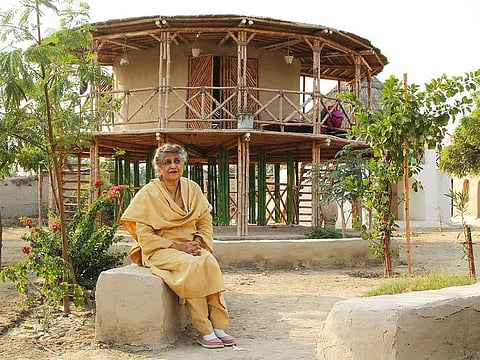Pakistan’s first woman architect Yasmeen Lari’s innovative solutions reap reward — UK’s Royal Gold Medal 2023
Lari is known as ‘Architect for the Poorest of the Poor’ for her humanitarian work

Islamabad: As the climate crisis intensifies, causing once-rare and severe weather events to become more frequent and destructive, one woman architect has emerged as a beacon of hope for homeless and displaced communities. Pakistan’s first woman architect Yasmeen Lari is changing the way we approach disaster relief and sustainable housing with her cost-effective and eco-friendly solutions.
After the record-breaking rains and floods of 2022, which affected 33 million Pakistanis, Lari and her team of architects and engineers immediately began constructing low-cost, low-tech and eco-friendly shelters in flood-affected regions using just mud, lime and bamboo.
Her innovative approach to designing disaster and climate-resilient homes addresses the urgent housing needs of those affected by natural disasters while empowering communities to rebuild their own homes and become self-sufficient. Instead of charity, “we are giving the flood survivors the power of rebuilding their own homes and empowering them” through architecture, Yasmeen Lari told Gulf News.
Lari’s reward
Lari, also known as the “Architect for the Poorest of the Poor”, has won the prestigious 2023 Royal Gold Medal for her humanitarian work. This award by the Royal Institute of British Architects (RIBA) is one of the world’s highest honours for architecture. Personally approved by King Charles III, the award will be officially presented to her in June. It recognises Lari’s lifetime work advocating zero-carbon self-build concepts for displaced populations.
The 82-year-old was surprised and delighted to receive the award, which has been given to renowned architects from across the world since 1848. This year’s winner is “A Pakistani, a female from the Global South, a Muslim of colour and someone who has dedicated her life to serving the poor” - all of which are firsts in the history of the gold medal, she told Gulf News.
Lari praised RIBA for “taking the lead in shifting the focus of architectural practice from wealth and privilege to a changed world suffering from rising poverty levels, disparities, and recurring disasters due to climate change”. She is optimistic that this timely shift will encourage young professionals to design for the disadvantaged and the homeless and implement principles to achieve climate resilience, sustainability and eco-justice.
From starchitect to humanitarian
* Born in Pakistan in 1941, Lari moved to London at age 15 with her family. After studying art for two years, she pursued a degree in architecture from Oxford Brookes University. * After graduating in 1964, she returned to Pakistan at age 23 with her husband, Suhail Zaheer Lari, to establish her own architecture firm Lari Associates and went on to work with major government, business, and financial institutions. * For 36 years, Lari was a starchitect, designing iconic modernist buildings before she shifted to humanitarian work in 2000. * The Heritage Foundation of Pakistan, which she co-founded with her husband in 1980, has built over 40,000 low-cost dwellings, making Pakistan a global leader in the largest zero carbon shelter programmes. Her other works include 80,000 smokeless stoves called Chulah Cookstoves, and bamboo community centres. * At the heart of this foundation lies Lari’s philosophy which she calls Barefoot Social Architecture (BASA). This approach emphasizes the importance of minimizing the impact of architecture on the natural environment and promoting social and ecological justice for marginalized communities. *Lari’s organisation “treats communities as partners, not victims” as she believes that empowerment is more effective than handouts, charity and aid.
Architecture empowering people
Simon Allford, the president of RIBA, described Yasmeen Lari as “an inspirational figure”, who has “shown us how architecture changes lives for the better”. In her second career, she transitioned from working in a large practice that catered to international clients to dedicating her focus entirely to humanitarian causes.
Through her work, she has “empowered the people of Pakistan” by engaging users in design and production processes in the field of architecture. “Lari’s work in championing zero carbon and zero waste construction is exemplary,” Allford said, adding that she has made affordable projects that address urgent accommodation and basic service needs using everyday materials and crafts.
After the 2005 earthquake, many international aid agencies focused their efforts on constructing expensive prefab homes made of concrete panels and iron sheets. However, architect Lari took a different approach and developed low-cost and resilient homes crafted from mud, stone, lime, and wood. Her groundbreaking work harnesses the power of community engagement and incorporating locally-sourced materials to make housing both sustainable and affordable.
Pakistan’s multi-award-winning architect’s innovative solutions include the Lari OctaGreen (LOG) emergency homes, designed to reduce the risk to lives and properties in flood-ravaged regions of Sindh and Balochistan. These one-room, 10x10-foot structures can be built within hours by six or seven people, empowering communities to build their own homes and generate income. This work is based on ‘Four Zeroes’ approach - zero carbon, zero waste, zero donor (except in-kind sponsorship) which leads to zero poverty, according to the foundation.
Lari’s cost-effective solutions have gained significant traction in Sindh province and now her organization has planned to provide one million shelters to homeless and displaced communities in Punjab and Balochistan within the next two years.
Each shelter unit for one family would require only Rs40,000 ($142) and would include essential amenities such as a bamboo shelter, eco-toilet, water, solar power, and stove, along with a plantation.
Yasmeen Lari’s journey from a successful starchitect to a pioneering humanitarian architect is an inspiration to many. Her modern solutions have not only transformed the lives of thousands in Pakistan but have also inspired architects and designers to think beyond aesthetics and prioritize sustainability, making her a true legend in the world of architecture.
Sign up for the Daily Briefing
Get the latest news and updates straight to your inbox



